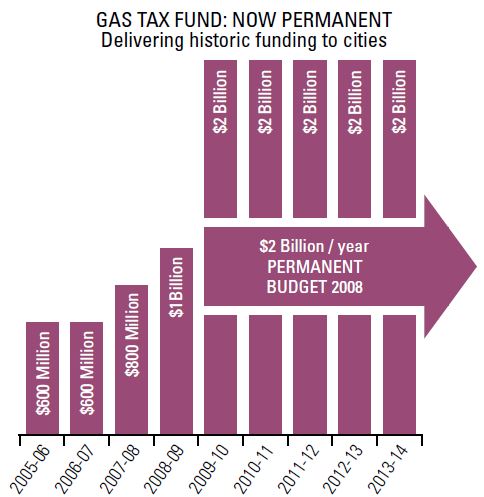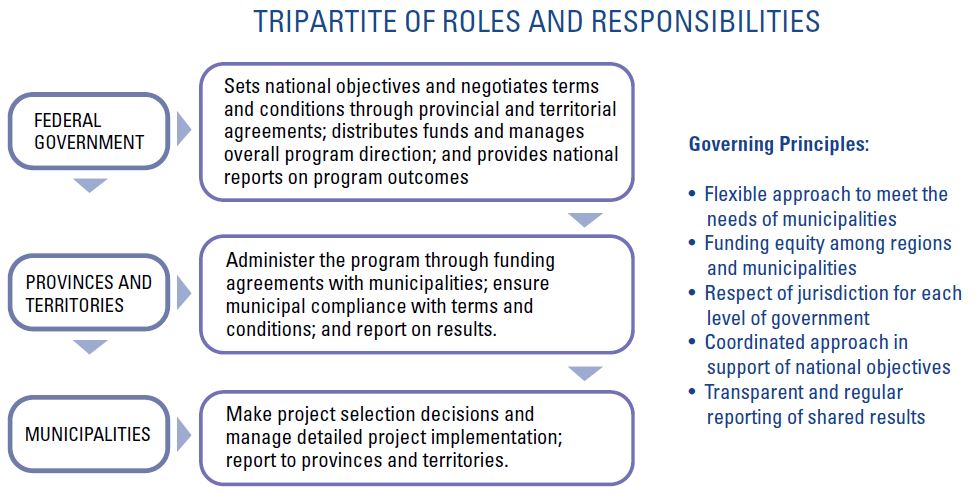ARCHIVED - Gas Tax Fund
Cleaner Water, Cleaner Air, Reductions in Greenhouse Gas Emissions
Archived Content
Information identified as archived is provided for reference, research or recordkeeping purposes. It is not subject to the Government of Canada Web Standards and has not been altered or updated since it was archived. Please contact us to request a format other than those available.
The Gas Tax Fund (GTF) makes capital investments in environmentally sustainable municipal infrastructure to improve water and air quality and reduce greenhouse gas emissions. Eligible investments include water, wastewater, solid waste, public transit, community energy systems, and local roads and bridges. Recognizing that communities best understand their own needs and priorities, the GTF combines predictable, long-term funding with local decision making and planning to enable municipalities to build and rehabilitate their core public infrastructure. Whatever the priority, the GTF program strives to meet the diverse needs of all communities while contributing to national environmental outcomes.
Shared Management, Shared Accountability
The GTF provides a new way of delivering federal funding for infrastructure, while respecting the jurisdiction of provinces and territories, and the responsibilities of municipalities. Funding is provided through negotiated bilateral agreements, between the Government of Canada and each province and territory. The money is allocated based on population with set amounts for Prince Edward Island and the territories to ensure these less-populated jurisdictions have access to sufficient funds for significant projects.

Gas Tax Fund: Now Permanent
Delivering historic funding to cities

Tripartite of Roles and Responsibilities
First Nations Infrastructure Fund
Announced in October 2007, the First Nations Infrastructure Fund (FNIF) pools resources from the Gas Tax Fund, the Municipal Rural Infrastructure Fund (MRIF) and the Indian and Northern Affairs Canada Capital Facilities Maintenance Program (CFMP) to create a $127 million program designed to meet the infrastructure needs for on-reserve First Nation communities within the provinces. This program includes $62.5 million in Gas Tax Funds and is administered by Indian and Northern Affairs Canada.
The FNIF seeks to:
- improve the health and safety of First Nations communities
- contribute to a cleaner and healthier environment
- enhance collaboration between the Government of Canada and First Nations communities and
- leverage other sources of funds for First Nation infrastructure projects.
The program is competitive and applicationbased. Bands or tribal councils will be typical applicants and the program's administration will include national and regional committees which review and recommend projects.
The federal government provides funding before work on projects begins and gives municipalities the added financial flexibility to pool, bank and borrow against the funding for their infrastructure needs. From the federal perspective, the up-front funding streamlines the administrative process and translates into increased speed and efficiency in program delivery. Meanwhile, municipalities have the ability to better plan and undertake projects when the work needs to be done.
The GTF complements the significant funding provided through other Building Canada plan programs, which are focused on specific national priorities.
This approach attempts to harness the strength of each level of government and has forged new collaborations and partnerships. In some instances, municipalities were directly involved in the negotiation of GTF agreements. In the case of British Columbia and Ontario, their municipal associations — the Union of British Columbia Municipalities and the Association of Ontario Municipalities — are signatories to their respective agreements as well as the administrators of the GTF. The Government of Canada also cultivated a new level of cooperation with Toronto by signing a GTF agreement directly with the city.
Integrated Community Sustainability Planning
A key component of the GTF agreements is a requirement for the signatory provinces and territories to ensure their municipalities move toward integrated community sustainability planning (ICSP). In essence, municipalities are asked to develop a vision of what their community should look like in the long term and a plan of how to achieve that vision. The GTF provides access to funds for this type of capacity building. The funding gives municipalities the opportunity to make better informed infrastructure investment decisions and ensures they plan now for future needs.
A Sustainability Lens for the ICSP
There is considerable flexibility in provincial and territorial approaches to ICSPs. Some general principles, however, underscore the GTF goal of moving beyond traditional community planning practices. These principles include a holistic, collaborative and coordinated approach that:
- takes into consideration the social, cultural, environmental and economic dimensions of a community's development
- involves community members in developing the ICSP plan and
- enhances and builds upon existing planning mechanisms, making linkages between different types of plans and planning activities including those of adjacent regions and municipalities.
The ICSP requirement in the GTF also recommends that communities undertake appropriate monitoring and evaluation to ensure they are on track in achieving identified objectives.

Integrated Community Sustainability Plan
In some provinces, existing legislated requirements satisfy the ICSP requirement. For example, Ontario requires official municipal plans as legislated under the provincialPlanning Act. Other provinces have similar obligations. Many municipalities, particularly larger urban centres, already have plans in place. The Government of Canada encourages those municipalities to elaborate on their plans by addressing new and emerging issues, such as adaptation to climate change, and to work toward more effective implementation of existing plans.
- Date modified: